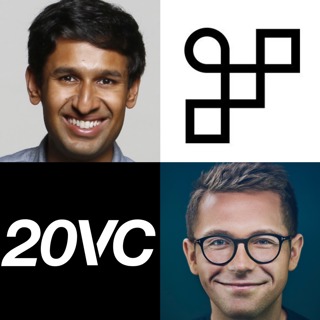
20VC: Why Small Funds Outperform Large Funds & AUM is a Vanity Metric | Why 99% of Investments in AI Startups Will Go To Zero | Being a "Traction First" VC & Investing Lessons from Investing in Canva and Missing Figma with Nikhil Basu-Trivedi
Nikhil Basu Trivedi is Co-Founder & General Partner at Footwork, an early-stage focused venture firm investing its first fund. In his venture career, he has invested in the early rounds of several companies that have exited or are currently valued at over $1B, including Athelas, Canva, ClassDojo, Color Health, Frame.io, Imperfect Foods, Lattice, and The Farmer's Dog. Prior to Footwork, Nikhil was a Managing Director at Shasta Ventures, on the investment team at Insight Partners, and on the founding team at Artsy. In Today's Episode with Nikhil Basu Trivedi We Discuss: 1. From Summer Intern to Founding a Firm: The 13 Year Journey: How did Nikhil first make his way into venture as an intern at Insight Partners in NYC? What does Nikhil know now that he wishes he had known on his first day in venture? Why does Nikhil advise all young VCs to "not look at their business card"? Why does title not matter in venture? Should founders meet with Juniors as well as GPs and more senior people? 2. Small Funds Outperform Large Funds: Why does Nikhil believe that small funds outperform large funds? Why is AUM the biggest bullshit metric in VC? How does Nikhil advise seed stage founders who have offers from seed firms for smaller rounds at lower valuations and are weighing them against larger rounds with higher valuations from multi-stage funds? Does Nikhil believe that platform value-added services really provide any value? 3. The Art of Investing: What has been Nikhil's biggest investing win? How has it changed his approach to investing? How does Nikhil prioritize between people, traction, and market? What is most important? What has been Nikhil's biggest investing miss? How has that changed his approach? Does Nikhil believe the great founders are immediately obvious? Why is market size the single question that keeps Nikhil up the most? 4. The Dysfunctions of Venture Capital: What are the single biggest areas of misalignment between GP and LP? What do many GPs see and know well that LPs should know and see more of? What are the biggest ways that decision-making breaks down in a venture fund? Why does Nikhil believe that so much of the investment in AI is going to go up in flames?
6 Syys 20231h
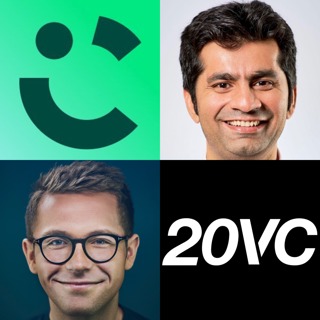
20VC: The $3.1BN Meeting That Led to an Uber Acquisition, The Battle With Uber; How to Outcompete When You Have 10x Less Cash & The Marketing Campaigns That Led to Pakistan MDs Fleeing and Elon Musk Fanboying with Mudassir Sheikha, CEO @ Careem
Mudassir Sheikha is the CEO and Co-Founder of Careem. Over the last 11 years, Mudassir has scaled the service to more than 80 cities in 10 countries, with 1,400+ colleagues and more than 2.5 million Captains. With such success, in 2020 Uber announced they would be acquiring Careem for a reported $3.1BN. Prior to Careem, Mudassir co-founded "DeviceAnywhere", a company that was acquired by "Keynote" in 2008 before joining the management consulting firm "McKinsey & Company" in Dubai. In Today's Episode with Mudassir Sheikha We Discuss: 1. From McKinsey to $3.1BN Exit to Uber: What was the founding a-ha moment for Mudassir with Careem? What does Mudassir know now that he wishes he had known at the beginning? What does Mudassir believe he is running away from? 2. Finding Product-Market Fit: What is the single biggest mistake founders make when trying to find product-market fit? Does Mudassir believe you have to do things that do not scale, to scale? What did Careem do? What are some of Mudassir's biggest pieces of advice to founders on finding a core target audience and doing customer discovery the right way? 3. Competing with Giants: How To Win When You Cannot Outspend: How did Careem beat Uber when they had 1/100th of their budget? What advice does Mudassir have for founders who have competition that is much better funded? What is the story of spending the night in bunk beds and barely sleeping before raising $300M the next day? How did that happen? 4. The Acquisition: How it Went Down: How did Mudassir and Dara @ Uber first come to meet? How did Dara's approach contrast with the prior approach of Travis Kalanick? Why did Mudassir decide to sell and join Uber? What were the main reasons or arguments against the acquisition? 5. Talk to me About: Careem's Pakistan MD having to flee Pakistan for his safety post a marketing campaign? Elon Musk likes one of Careem's promotional videos and why? An investor who wired $1M with absolutely no paperwork? The catch up meeting that turned into a $3BN offer?
4 Syys 202347min
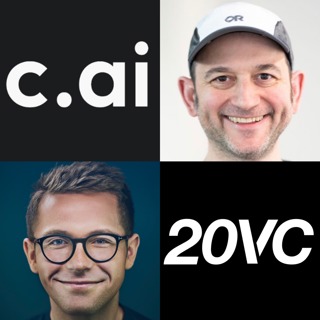
20VC: Spending $2M to Train a Single AI Model: What Matters More; Model Size or Data Size | Hallucinations: Feature or Bug | Will Everyone Have an AI Friend in the Future & Raising $150M from a16z with Noam Shazeer, Co-Founder & CEO @ Character.ai
Noam Shazeer is the co-founder and CEO of Character.AI, a full-stack AI computing platform that gives people access to their own flexible superintelligence. A renowned computer scientist and researcher, Shazeer is one of the foremost experts in artificial intelligence (AI) and natural language processing (NLP). He is a key author for the Transformer, a revolutionary deep learning model enabling language understanding, machine translation, and text generation that has become the foundation of many NLP models. A former member of the Google Brain team, Shazeer led the development of spelling corrector capabilities within Gmail, the algorithm at the heart of AdSense. In Today's Episode with Noam Shazeer We Discuss: 1. Entry into the World of AI and NLP: How did Noam first make his way into the world of AI and come to work on spell corrector with Google? What are 1-2 of his biggest takeaways from spending 20 years at Google? What does Noam know now that he wishes he had known when he started Character? 2. Model Size or Data Size: What is more important, the size of the data or the size of the model? Does Noam agree that "we will not use models in a year that we have today?" What is the lifespan of a model? Does Noam agree that the companies that win are those that are able to switch between models with the most ease? With the majority of data being able to be downloaded from the internet, is there real value in data anymore? 3. The Biggest Barriers: What is the single biggest barrier to Character today? What are the most challenging elements of model training? Why did they need to spend $2M to train an early model? What are the most difficult elements of releasing a horizontal product with so many different use cases? Where does the value accrue in the race for AI dominance; startups or incumbents? 4. AI's Role on Society: Why does Noam believe that AI can create greater not worse human connections? Why is Noam not concerned by the speed of adoption of AI tools? What does Noam know about AI's impact on society that the world does not see?
31 Elo 202335min
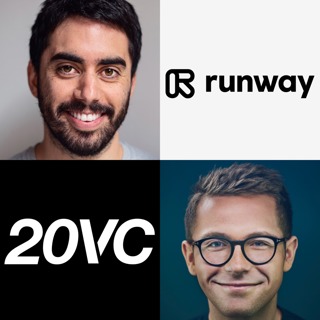
20VC: Why AI Models are not a Moat, Where Does the Value in AI Accrue; Startups or Incumbents, What the World Has Got Wrong About AI, Why AI Needs a New Story and Who is the Right People to Tell it with Cris Valenzuela, Co-Founder & CEO @ Runway
Cris Valenzuela is the CEO and co-founder of Runway, the company that trains and builds generative AI models for content creation. To date, Cris has raised over $285M for the company from the likes of Lux Capital, Felicis, Coatue, Amplify, and Nvidia to name a few. Runway's customers include academy-nominated movies, TV shows, media companies, and creatives across industries. In Today's Episode with Cris Valenzuela We Discuss: 1. From Childhood in Chile to Founding one of the Hottest AI Startups: What was the founding moment for Cris with Runway? His investors described Cris as an "outsider". Does Cris believe he is an outsider? What are the biggest pros and cons of being an outsider? What does Cris believe he is running from? What is he running towards? 2. Models are not a Moat: Models 101: What does Cris believe is more important; model size or data size? Why does Cris believe that models are not a moat? How does Cris think about the lifespan of models? Will any used today be used in a year? Are hallucinations a feature or a bug? What are the nuances? 3. The World Has Got AI Wrong: We Need Different Stories: Why does Cris believe the world has got AI wrong? Why do we need different stories for what AI can do and will be? Who should tell them? Why do groups like screenwriters riot and protest if the tool is empowering and not replacing? 4. Company Building 101: Hiring and Fundraising: What are the biggest pieces of startup advice that are total BS? What has been the single biggest lesson Cris has learned when it comes to fundraising? Does Cris believe that VCs really add value? What have been the single biggest hiring mistakes that Cris has made? How has Cris structured their interview process to make it the best interview process in the world?
28 Elo 202341min
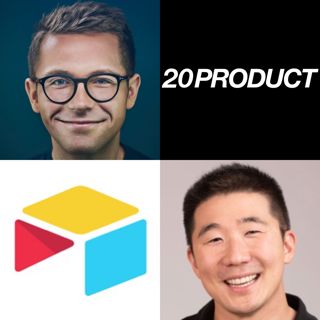
20Product: Enterprises are not Adopting AI Yet, When Will AI Break Into Enterprise, What are the Blockers, What Do Enterprises Need from AI & Why Services Companies Will Win in the Next 10 Years of AI Implementation with Howie Liu, Founder & CEO @ Airtabl
Howie Liu is the Founder and CEO @ Airtable, the fastest way to build apps for your business. To date, Howie has raised over $1BN with Airtable with the last round valuing the company at $11BN and an investor base including Benchmark, Thrive, Caffeinated, Greenoaks and Coatue to name a few. In Todays Episode with Howie Liu We Discuss: 1. Scaling into Enterprise: What are the single biggest challenges when moving from PLG to enterprise? Why does Howie believe you have only truly hit enterprise when you sign $1M contracts? How long did it take for Airtable to sign their first $1M ARR contract? How can founders know when is the right time to scale into enterprise? How does the product need to change with the scaling? 2. Enterprises: Do They Really Love AI: Why does Howie believe that enterprises are not jumping on AI yet? When does enterprise interest turn into enterprise buying and purchasing? What are the single biggest barriers to enterprises buying AI solutions today? Post-purchase, what are the biggest implementation challenges for enterprises with AI? 3. The Changing Sales Process: Are we seeing the bundling of tools within large enterprises today? Which categories and vendors are most vulnerable? Which will survive the cuts? What do vendors need to do to prove to CFOs that they need to remain in their budget? How has the customer success process changed over the last year with tightening budgets? 4. Howie Liu: AMA: Airtable famously got Benchmark to lead their Series C, how did this come to be when they famously always only do Series A? Why does Howie believe that it is total BS to suggest post-PMF, everything is good? What does Howie know now that he wishes he had known when he started Airtable?
25 Elo 202339min
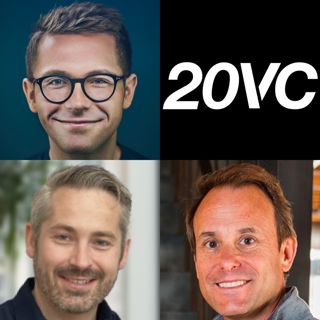
20VC: NEW FORMAT: Mega Funds Will Come Back, Why Markups Have Corrupted VC, Why RIFs Should Always Be An Embarrassment To SaaS Founders and Why Pitching is BS and Fake with Jason Lemkin and Rick Zullo
Jason Lemkin is the Founder @ SaaStr one of the best-performing early-stage venture funds focused on SaaS. In the past, Jason has led investments in Algolia, Pipedrive, Salesloft, TalkDesk, and RevenueCat to name a few. Prior to SaaStr, Jason was an entrepreneur, selling EchoSign to Adobe for $100M where it is now a $250M ARR product. Rick Zullo is the Co-Founder and General Partner at Equal Ventures. Prior to co-founding Equal Ventures, Rick was an investor at Lightbank, Prior to Lightbank, Rick worked with investment firms Foundation Capital, Bowery Capital, and Lightview Capital. In Today's Episode We Discuss: 1. Why Venture Capital Needs It's Jerry Maguire Moment: Why does Rick believe that VC needs it's "Jerry Maguire" moment? What needs to change? What needs to stay the same? Why does Jason believe we will see even more mega funds in 2024 and 2025? 2. Unicorns are So 2019: Why does Jason believe that "unicorn investing is mostly dead for bigger funds and none of them are looking for a $1BN outcome anymore?" Why does Rick believe that multi-stage fund investing at seed simply does not make sense? What does Rick believe many founders need to know when they take multi-stage money at seed? Of the over 1,000 unicorns created over the last few years, how many of them do Rick and Jason feel are actually unicorns today? 3. Efficiency and Growth: We Need it All: Why does Jason believe, as a founder you should be embarrassed if you ever had a RIF (reduction in force)? Last year many founders got a pass on growth as they were more efficient. Is that pass over? Do they need to get back to growth? What is the single biggest reason that companies do not scale from seed to Series A? What happens to the many companies with years of runway but no product-market-fit? Are we entering a new age of efficient company building or will we go back to high burn environments and excessive spending? 4. Entering the World of LPs: If Jason and Rick were to advise LPs today on how much to discount the value of their venture books, what advice would they give? How have markups completely corrupted the venture ecosystem? How does LPs being incentivized by paper-marks make the industry even more screwed? What are the single biggest misalignments between GP and LP?
23 Elo 202354min
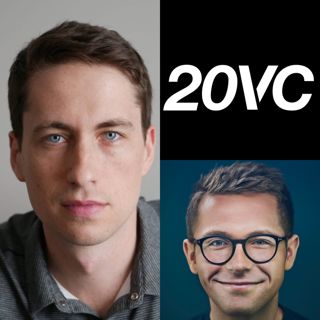
20VC: The Biggest Lies of Silicon Valley, Why Entrepreneurship is Not For Everyone, Why VCs are Out of Touch, Why Many Would Be Great Entrepreneurs Will Burn Out, Why You Should Let Your Children Suffer and Why You Will Choose The Wrong Partner with Nick
Nick Huber is a serial entrepreneur, investor, and content creator focused on real estate and small business. In the last 9 months, Nick has co-founded 6 companies including RE Cost Set, RecruitJet, Titan Risk, Blue Key Capital, Tax Credit Hunter, and WebRun Labs. His primary business, Bolt Storage, owns 1.8M sqft of self-storage facilities across 62 locations in 11 states. In Todays Episode with Nick Huber We Discuss: Wealth: What the richest families in the world all understand and what the majority of people forget? What are the two best ways to make money as an employee? What do most forget/not do? Why money does make you happy and why society drastically undervalues wealth today? Why we should not be concerned by the levels of income inequality? Marriage and Parenting: 5. Why it is BS to not pass your wealth down to your children? 6. Why you have to let your kids suffer in order for them to grow? 7. How do you stop kids from becoming assholes if they are brought up with money? 8. Why the majority of the time, people choose the wrong partner? What should we look for? 9. What is the number one thing you can do to set your child up for success? Silicon Valley and Entrepreneurship: 10. Why entrepreneurship is not for everyone? Who is it for? 11. Why VCs are out of touch and naive? 12. What is the single biggest lie of Silicon Valley? 13. Why will so many would-be great entrepreneurs burn themselves out when they should not have to? Management and Brand Building: 14. How to build a brand today? Why you have to be controversial to be interesting? 15. How to deal with hate and criticism? Why you cannot please everybody? 16. Why woke culture can give you an advantage if you do not have it? 17. How to build a strategic network the right way? How to become a card in someone's rolodex? 18. What is the single worst thing you can do when hiring? 19. What do you do when you lose trust in an employee?
21 Elo 202357min

20VC: Does Value Accrue to Incumbents or Startups in the AI Race, Why Model Size Matters More Than Data Size, Why Artificial General Intelligence is Far Away, Why Carpenters Will Be Paid More Than Software Engineers & Future of Jobs with Richard Socher
Richard Socher is the founder and CEO of You.com. Richard previously served as the Chief Scientist and EVP at Salesforce. Before that, Richard was the CEO/CTO of AI startup MetaMind, acquired by Salesforce in 2016. He is widely recognized as having brought neural networks into the field of natural language processing, inventing the most widely used word vectors, contextual vectors and prompt engineering. He has over 150,000 citations and served as an adjunct professor in the computer science department at Stanford. In Today's Episode with Richard Socher We Discuss: 1. The Decade-Long Journey to Becoming an AI OG: How did Richard first make his way into the world of AI over a decade ago? What are 1-2 of his biggest lessons from working with Marc Benioff? How did 5 years at Salesforce impact how he both thinks and operates? 2. Models: Does Size Matter: How important is model size? Is data size more important? What are the biggest misconceptions people have around models today? How does Richard respond to the suggestion that "many startups are wrappers around LLMs"? Are hallucinations a feature or a bug? 3. Where Does Value Accrue: Where does Richard believe most of the value will accrue; startup or incumbent? Which incumbents are best positioned to win? Which are the laggards and behind? What do many not see about the startup vs incumbent race in the AI war? 4. Open vs Closed: Which Wins: Does Richard favour Yann LeCun's open approach? Or is the world of AI more closed? What are the biggest challenges of an open ecosystem? What are the nuances that make both challenging? 5. Richard Socher: AMA: Why will carpenters be paid more than software engineers in 10 years? Why is AGI still way off? Are people too unrealistic? How much money does Google make off search every day? Why does that leave them vulnerable?
18 Elo 202345min






















